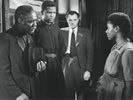Eye For Film >> Movies >> Cry, The Beloved Country (1952) Film Review
Made in the early Fifties, and set in contemporary South Africa, Zoltan Korda’s film casts a perceptive gaze on the society of the period, and makes an impassioned and enlightened case for improving the conditions of the black population.
A disturbing letter sends Reverend Kumalo, an ageing rural priest, to Johannesburg for the first time, to look for his daughter and son, who left the village for the city and never came back.

Looking out from the train on the gold mines – marked by great dull heaps of earth lined up one after the other – he turns to his fellow passenger:
“What do the white men do with the gold?”
“Sell it to the white man in America.”
“And what do they do?”
“They have a big hole in the ground, and they put it all back in again. You see, that is what makes the world go around.”
The lines are spoken in good humour, the better to reproach (some) white men’s hollow but stubborn rhetoric of racial superiority, later on.
The outstretched South African farmland and bush give way to the claustrophobic squalor of Johannesburg’s black quarters. Although accustomed to poverty, the Reverend Kumalo is not prepared for sights of the slums and shanty towns where he ends up looking for his children.
If the daughter, fallen into prostitution, is a disappointment, a worse shock awaits when he finds his son. Absalom Kumalo was supposed to be back on the straight and narrow after a spell in the reformatory, but it looks like he is now beyond his father’s help.
Gradually, Kumalo’s story becomes intertwined with that of a white landowner from his home district, also called to Johannesburg when his son, an advocate for black rights, is killed.
The performances are occasionally as melodramatic as you would expect from a social drama of the era, often naïf, but more important, they frequently have a compelling immediacy and honesty. Canada Lee maps the emotional travails of Reverend Kumalo perfectly: awe as he first takes in the chaos of Johannesburg, to incomprehension and pain as he struggles to understand what has happened to his children. The poverty of the village, symbolised by his decaying church, is nothing compared to the cruelty of life in the city, where the disparity between black and white is far more acute.
Vivien Clinton in her minor role as Absalom’s woman, is as impressive as other characters who get more screen time, and there is a memorable scene between her and Lee, when the young girl, bewildered by the old man’s grief and anger, tries to persuade him that she wants to be part of his family. Sidney Poitier also puts in a solid performance as the strong-minded young priest who accompanies Kumalo on his journey through Johannesburg.
Cry, the Beloved Country is striking for its damning view of the colonial mindset, put forward unflinchingly. Though stylistically it has dated somewhat, the message still resonates. But its greatest achievement is being able to weave the disparate experiences of a large number of characters into a convincing and well-composed narrative.
Reviewed on: 19 Feb 2010



















